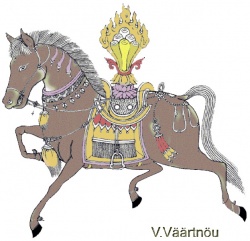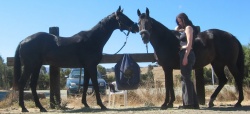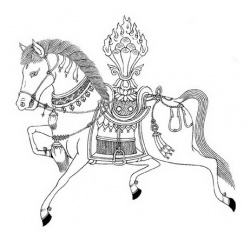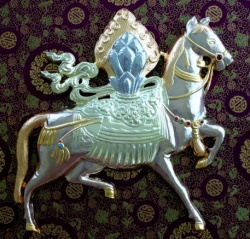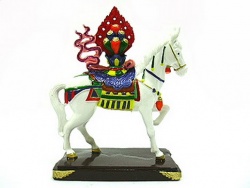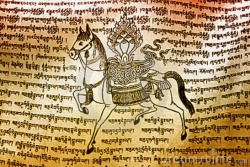Lungta
LUNGTA (Tib.) "Prayer- flags" strung up around buildings and sacred places to bring good fortune.
Lungta (རླུང་རྟ་, Wyl. rlung rta or ཀླུང་རྟ་, klung rta) literally 'windhorse'. A mythical Tibetan creature symbolizing the inner air or wind of the body and related aspects of the Buddhist path.
The windhorse is an ancient symbol of the freedom and energy of our own intrinsic nature. With the Three Jewels of Buddha, Dharma, and Sangha on its back, the windhorse flies through the air, carrying Buddha’s teaching of Inherent Perfection to beings in all directions.
Lung-ta, which translates as Wind Horse, is the name given to a particular kind of prayer flag, seen flying in its hundreds from mountain tops, hill sides, high passes, near rivers, across bridges, on people's homes and around holy sites.
When the wind catches the flags, the prayers printed on them are carried on the breeze and distributed for the benefit of all living things. The purpose of Lung-ta prayer flags is to entreat the Wind Horse to intercede on our behalf, by petitioning Buddhist deities and protectors, to give us good fortune and to remove obstacles from our way.
The flags normally have a horse in the middle and one of the majestic mythical animals in each of the four corners, the snow lion, garuda, dragon and tiger, which represent heavenly qualities.
The Wind Horse ultimately a symbol of the wind transforming our prayers/mantras.
Overview
The meaning of lungta (windhorse) can be described on several levels:
- Outer – a mythical Tibetan creature
- Inner – positive qualities such as ‘good luck’
- Secret – the space element (one of the five elements)
- Most secret – the inner air or wind within the body
Outer Level: Mythical Creature
On the outer level, the lungta is a mythical Tibetan creature from pre-Buddhist times that combines the speed of the wind and the strength of the horse to carry prayers from earth to the heavens.
Inner Level: Positive Qualities
Lungta is associated with positive energy or ‘life force’ and with ‘good luck’. It is both the subduer of evil and the vehicle of enlightenment.
The lungta symbol is often depicted on prayer flags, which are flown to generate merit and increase one's life force. Lungta prayer flags typically display a tiger, a snow lion, a garuda, and a dragon, (the four dignities) with a lungta in the center. Certain lungta prayers also refer to these four symbols.
The tiger, snow lion, garuda, and dragon are ancient symbols of the qualities of lungta that originate with pre-Buddhist Tibetan and Chinese astrological traditions. Generally, they symbolize the fearlessness and resilience of lungta. (See Shambhala: The Path of the Warrior.)
Secret Level: The Space Element
At a deeper level, the lungta and the four dignities symbolize the play of the five elements, out of which all phenomena are formed. The lungta symbolizes space, the ground of all manifestation; in fact, in astrological texts lung ta is sometimes spelt ཀློང་རྟ་, longta, 'horse of space'. The tiger symbolizes the wind element; the snow lion, earth; the garuda, fire; and the dragon, water.
Traditionally, they are set out in the same configuration as the five-part mandala used for the five buddha families, as can be seen in lungta prayer flags.
Most Secret Level: The Inner Air or Wind
In Tibetan Buddhism, the mind is seen as being dependent on, or mounted on, the subtle energy or inner air or wind within the body. This subtle energy is therefore called the ‘windhorse’, in Tibetan lungta. Whether the wind-horse is strong or weak determines whether positive or negative tendencies dominate the mind. On an everyday level, the windhorse is also very much linked to what is commonly known as ‘good luck’.
Orgyen Tobgyal Rinpoche explains:
- "All the experiences [of the six realms] are the result of karma, and it is mind that is responsible for the creation of karma, nothing else. Every experience of passing pleasure and pain and all the seemingly small and incidental occurrences of our lives arise because of the mind.
- However, we have no power or control over the mind at all. We may have in our mind the intention of doing something of a very virtuous and positive nature, but if something goes wrong our mind can change instantly and become very negative. We can also experience states in which we are motivated in a negative, non-virtuous way and then find that our motivation changes and becomes positive.
- What really controls the mind is lung [Tib.], the ‘wind’ or ‘subtle energy’ that determines the direction that the mind pursues. Thoughts arise in our minds and as they arise and we react to them, we create karma. The windhorse, the mount upon which the mind rides like a rider on a horse, controls or directs the thoughts arising in our minds.
- If we are confused about the essential nature of an arising thought, it may well be a cause for the perpetuation of samsara. If there is no confusion about the fundamental nature of the thought, the essence of that thought can free itself into dharmakaya. As the thought frees itself, the enlightened mind of buddhahood arises. The very same thought can lead to a state of freedom or to a state of confusion, and the direction it takes depends upon lung ta.
- Lung ta is actually sem, ‘the ordinary, conceptual mind’. When lung ta is low, everything becomes a problem: our ability to make progress with both our worldly projects and the Dharma will decrease. One of the signs of lung ta being low is not feeling well or being ill at ease. This is a common symptom in the present age; almost everybody’s mind is unhappy, unclear and dull.
- If lung ta flourishes and becomes more positive, then even former tendencies that brought about non-virtuous or negative karma—ordinary thoughts of the five poisons of attachment, aversion, ignorance, jealousy, and pride—can be transformed into a more positive manifestation. They arise in their true nature as the five aspects of yeshe, or 'primordial wisdom' of 'timeless awareness' (rigpa), through the power of lung ta.
- However, if our lung ta is neither flourishing nor nurtured, even if we are motivated to do something positive or virtuous, our motivation can change or be spoilt. For example, we might enter the path of Dharma and make attempts at establishing a regular practice, but find that our ordinary, negative thoughts drag us down and perpetuate samsara, because our lung ta is weak and our minds are continually weighed down by negativity. Even if people think they will practise the Dharma, do retreats or meditate on compassion and emptiness, unless their lung ta is stable the outcome will be the opposite of what they intended.
- From the outset the lung ta of beings throughout the three realms and of ordinary human individuals in this realm has been impaired and flawed. On top of that, in these times of spiritual degeneration, a continual degrading of our own and others’ lung ta is taking place. The mind becomes increasingly obscured and rigpa becomes increasingly hidden from the ordinary mind.
- When we pray to Guru Rinpoche and invoke his blessing, offer sang and engage in other practices that cause the flourishing of lung ta, we awaken the clarity aspect of mind. We awaken our rigpa, so that it is more perceptible to us. The ultimate point of such practice is to awaken the clarity aspect of our minds, to bring us into closer contact with our own rigpa. We may even discover the enlightened intent of kadak, or ‘primordial purity’, where neither suffering nor even the concept of suffering remain to be dealt with."
Etymology
Namkhai Norbu Rinpoche points to another etymology of the term, deriving from the Tibetan klung rta:
- The word lungta (ཀླུང་རྟ་, klung rta) is composed of two syllables: the first, lung, represents the element 'space' in the fivefold classification of the elements 'earth, water, fire, air and space' and signifies 'universal foundation' or 'omnipervasiveness'. [...] The second syllable ta (horse) refers to the 'excellent horse' (རྟ་མཆོག་, rta mchog), and since in ancient times in Tibet the horse was the symbol of travelling with the greatest speed, in this case it seems to refer to the transmutation of every thing that depends on the five elements from negative to positive, from good to bad, from misfortune to good fortune, from baleful portents to auspicious signs, from poverty to prosperity, and it implies that this should ensue with the greatest speed.
- [...] I believe this to be the true meaning of lungta. In more recent times the custom has arisen of spelling this word རླུང་རྟ་, rlung rta (wind horse), ascribing to it the meaning 'that which rides the wind', but I think this is derived from the practical function of the lungta flags of being raised in the sky and moved by the wind.[1]
༄༅། །རླུང་རྟའི་བ་དན་གྱི་མཆོད་པ་འདོད་དགུ་མྱུར་སྩོལ་བཞུགས། །
The Swift Fulfilment of All Wishes—Offering the Flag of Windhorse Composed by Mipham Rinpoche ཧོ། ཀུན་ཁྱབ་དག་པ་ཡེ་ཤེས་ཆེན་པོ་ལས། ། ho künkhyab dakpa yeshe chenpo lé Ho! Within the all-pervading purity of primordial wisdom, རྣམ་རོལ་མ་འགགས་རང་སྣང་བཀོད་པའི་རྒྱན། ། namrol magak rangnang köpé gyen Appearances arise, unceasing, as the ornaments of my perception; བཀྲ་ཤིས་རླུང་རྟ་སྙན་པའི་བ་དན་ཆེ། ། tashi lungta nyenpé baden ché And the great flag of the windhorse, auspicious, sweet‑sounding far and wide, ཀུན་བཟང་མཆོད་པའི་སྤྲིན་ཆེན་རབ་ཏུ་འཕྲོ། ། künzang chöpé trin chen rabtu tro Sends out, like Samantabhadra, a vast cloud of exquisite offerings. རྫུ་འཕྲུལ་ཤུགས་ལྡན་རྟ་རྒྱལ་བ་ལ་ཧ། ། dzutrul shukden ta gyal balaha Miraculous and mighty is the king of horses, Bālāha,1 རྣམ་མང་རིན་ཆེན་རྒྱན་སྤྲས་རླུང་ལྟར་འཕྱོ། ། nam mang rinchen gyen tré lungtar cho Adorned with the jewel of many kinds, he soars like the wind, གང་བསམ་ཐོགས་མེད་བགྲོད་པ་རྡོ་རྗེའི་སྟོབས། ། gang sam tokmé dröpa dorje tob And travels, unimpeded with his indestructible strength, wherever we so wish. རྫུ་འཕྲུལ་རྐང་པ་བཞི་ཡི་རོལ་པ་ལས། ། dzutrul kangpa shyi yi rolpa lé From his four miraculous limbs, there spread out ཕྱོགས་བཞིར་སྟག་སེང་ཁྱུང་འབྲུག་འཕྱོ་ཞིང་ལྡིང་། ། chok shyir tak seng khyung druk cho shying ding In the four directions, a tiger, lion, garuḍa and dragon, taking flight and soaring in the sky. ས་དང་བར་སྣང་ནམ་མཁའི་ཁྱོན་ཀུན་ཏུ། ། sa dang barnang namkhé khyön küntu Over the earth, in the air, and through the whole expanse of space, བདེ་དང་ལེགས་དང་རྒྱལ་དང་གྲུབ་པ་ཡི། ། dé dang lek dang gyal dang drubpa yi Sounds of happiness ring out, of goodness, victory and accomplishment, བཀྲ་ཤིས་གླུ་དབྱངས་ལྷ་ཡི་རྔ་སྒྲ་སོགས། ། tashi luyang lha yi ngadra sok In songs of auspiciousness, with the resounding drum beat of the gods, རོལ་མོའི་དབྱངས་བཅས་མེ་ཏོག་ཆར་འབེབས་ཤིང་། ། rolmö yangché metok charbeb shing And melodious strains of music. While flowers fall like rain, ལྷ་རྫས་མཆོད་པའི་སྤྲིན་གྱིས་ཕྱོགས་ཀུན་ཁྱབ། ། lhadzé chöpé trin gyi chok künkhyab Clouds of divine offerings pervade every direction, ས་གསུམ་དགེ་བའི་བཀྲ་ཤིས་དཔལ་ཡོན་གྱི། ། sa sum gewé tashi pal yön gyi And all that is excellent throughout the three worlds— ལེགས་ཚོགས་མ་ལུས་ལྷུན་གྱིས་གྲུབ་པ་ཡི། ། lek tsok malü lhün gyi drubpa yi Auspiciousness, glory and riches—manifests spontaneously. ཡིད་བཞིན་འདོད་འབྱུང་མཆོད་པའི་གཏེར་ཆེན་འདི། ། yishyin dö jung chöpé terchen di This vast offering treasure, containing all that could ever be wished for, རྩ་བརྒྱུད་བླ་མ་ཡི་དམ་ཞི་ཁྲོའི་ལྷ། ། tsa gyü lama yidam shyitrö lha We offer to the root and lineage masters, the peaceful and wrathful yidam deities, གནས་གསུམ་མཁའ་འགྲོ་དམ་ཅན་ཆོས་སྐྱོང་ཚོགས། ། né sum khandro damchen chökyong tsok The ḍākinīs of the three places, and oath-bound Dharma protectors, དགྲ་བླ་ཝེར་མ་ནོར་ལྷ་གཏེར་བདག་དང་། ། drala werma norlha terdak dang Dralas, wermas, wealth gods and treasure-keepers, ཡུལ་ལྷ་གཞི་བདག་དཀར་ཕྱོགས་སྐྱོང་བའི་སྡེ། ། yul lha shyidak karchok kyongwé dé Local deities, masters of the earth, all who safeguard what is beneficial and wholesome, འགོ་ཞིང་སྐྱོབ་པ་མཆོད་པའི་མགྲོན་གྱུར་ཀུན། ། go shying kyobpa chöpé drön gyur kün And all you guests who care for and protect us— འདི་ལ་ཆེད་དུ་དམིགས་པའི་ལྷ་ཡི་ཁ་བསྒྱུར་འཛུད་པར་འདོད་ན། At this point, should you wish to address prayers to particular deities, you may insert verses such as these: Gesar ཁྱད་པར་གེ་སར་ནོར་བུ་དགྲ་འདུལ་རྩལ། ། khyepar gesar norbu dradul tsal Especially you, Gesar Norbu Dradul, རྫུ་འཕྲུལ་རྡོ་རྗེའི་རྐྱང་རྒོད་ཕེར་པོ་དང༌། ། dzutrul dorje kyang gö perpo dang With your miraculous, wild and skilful vajra steed, དཔའ་རྟུལ་དྭངས་སྨན་བཀའ་སྡོད་ཕོ་ཉར་བཅས། ། patul dangmen kadö ponyar ché Your fearless warriors, ladies, attendants and envoys— གསོལ་ལོ་མཆོད་དོ་བསྟོད་དོ་མངའ་གསོལ་ལོ། ། sol lo chö do tö do ngasol lo We pray to you, make offerings, praise and exalt you! དབུ་འཕང་གཉན་པོ་ཆོས་ཀྱི་དབྱིངས་སུ་བསྟོད། ། upang nyenpo chö kyi ying su tö Your awesome majesty we glorify as high as the dharmadhātu! ཅེས་ཚིགས་བཅད་གཅིག་བསྣན། Hayagrīva ཁྱད་པར་སྣང་སྲིད་དབང་སྡུད་སྟོབས་ཀྱི་ལྷ། ། khyepar nangsi wangdü tob kyi lha You who magnetize all appearance and existence, deity of power, པདྨ་དབང་ཆེན་རྟ་མཆོག་རོལ་པ་ཡི། ། pema wangchen tachok rolpa yi ‘Mighty Lotus’ Hayagrīva, དཀྱིལ་འཁོར་ལྷ་ཚོགས་བཀའ་སྡོད་ཕོ་ཉར་བཅས། ། kyilkhor lhatsok kadö ponyar ché With all the deities of your mandala, attendants and emissaries— གསོལ་ལོ་མཆོད་དོ་བསྟོད་དོ་མངའ་གསོལ་ལོ། ། sol lo chö do tö do ngasol lo We pray to you, make offerings, praise and exalt you! དབུ་འཕང་གཉན་པོ་ཆོས་ཀྱི་དབྱིངས་སུ་བསྟོད། ། upang nyenpo chö kyi ying su tö Your awesome majesty we glorify as high as the dharmadhātu! ཅེས་ཚིགས་བཅད་གཅིག་བསྣན་ལ། དེ་བཞིན་དུ། Tsokdak ཁྱད་པར་དཔལ་མགོན་ཚོགས་བདག་ཡབ་ཡུམ་དང༌། ། khyepar palgön tsokdak yabyum dang Glorious protector Ganapati, with your consort, སྐུ་གསུང་ཐུགས་མགོན་ཕྱོགས་བཅུ་སྡེ་བརྒྱད་མགོན། ། ku sung tuk gön chok chu dé gyé gön Protectors of body, speech and mind, and protectors of the eight classes in the ten directions, དགྲ་བླ་དམག་དཔོན་ཚེ་རྫི་ཤུགས་མགོན་བཅས། ། drala makpon tsedzi shukgön ché Along with the drala Makpön Tsedzi Shuk— གསོལ་ལོ་མཆོད་དོ་བསྟོད་དོ་མངའ་གསོལ་ལོ། ། sol lo chö do tö do ngasol lo We pray to you, make offerings, praise and exalt you! དབུ་འཕང་གཉན་པོ་ཆོས་ཀྱི་དབྱིངས་སུ་བསྟོད། ། upang nyenpo chö kyi ying su tö Your awesome majesty we glorify as high as the dharmadhātu! ཅེས་དང་། Magyal Pomra ཁྱད་པར་མདོ་ཁམས་ཤར་ཕྱོགས་ཡུལ་སྐྱོང་ཆེ། ། khyepar dokham sharchok yulkyong ché Great guardian of the eastern lands of Dokham, རྨ་རྒྱལ་སྤོམ་ར་འཁོར་དང་བཀའ་ཉན་དང༌། ། magyal pomra khor dang kanyen dang Magyal Pomra, with your entourage and attendants, མ་སང་དགྱེས་སྡེ་སྨན་གྱི་ཚོགས་དང་བཅས། ། masang gyé dé men gyi tsok dangché Masang wermas and dralas, with all your ladies— གསོལ་ལོ་མཆོད་དོ་བསྟོད་དོ་མངའ་གསོལ་ལོ། ། sol lo chö do tö do ngasol lo We pray to you, make offerings, praise and exalt you! དབུ་འཕང་གཉན་པོ་ཆོས་ཀྱི་དབྱིངས་སུ་བསྟོད། ། upang nyenpo chö kyi ying su tö Your awesome majesty we glorify as high as the dharmadhātu! ཅེས་ཚིགས་བཅད་གཅིག་བསྣན་པར་བྱའོ། ། ཞེས་སོགས་ཚིགས་བཅད་གཅིག་བསྣན་ནས། མཇུག་ཏུ་རང་ཞུང་ལས། Then, returning to the main prayer: གསོལ་ལོ་མཆོད་དོ་བསྟོད་དོ་མངའ་གསོལ་ལོ། ། sol lo chö do tö do ngasol lo We pray to you, make offerings, praise and exalt you! དགྱེས་རབ་མཆོག་ལྡན་མཉེས་རབ་ཕུལ་གྱུར་ནས། ། gyé rab chokden nyé rab pul gyur né By offering you these supremely delightful and pleasing gifts, མཐུ་སྟོབས་ནུས་པ་རྡོ་རྗེའི་རླུང་ཤུགས་ཀྱིས། ། tutob nüpa dorje lung shuk kyi Let the forceful vajra wind of your power and strength, རྣལ་འབྱོར་བདག་ཅག་འཁོར་དང་བཅས་པ་ཡི། ། naljor dakchak khor dang chepa yi For us practitioners and those around us, ཚེ་དཔལ་བསོད་ནམས་རླུང་རྟའི་སྟོབས་བསྐྱེད་ནས། ། tsé pal sönam lungté tob kyé né Increase our life, prosperity, merit and the strength of our windhorse. གང་འདོད་ཕྲིན་ལས་ཐོགས་མེད་ཡིད་བཞིན་འགྲུབ། ། gang dö trinlé tokmé yishyin drub And with your actions, unimpeded in any way, make whatever we wish for come to be, just as we desire. མི་མཐུན་ཕྱོགས་རྣམས་མཐུན་པའི་གྲོགས་སུ་བསྒྱུར། ། mitün chok nam tünpé drok su gyur Transform everything that hinders and troubles us into an ally, བཀྲ་ཤིས་དགེ་མཚན་སྙན་པའི་བ་དན་བསྒྲེངས། ། tashi getsen nyenpé baden dreng Hoist high the inspiring flag of auspiciousness and virtue, ཕ་རོལ་རྒོལ་བ་ཐམས་ཅད་ཟིལ་གྱིས་ནོན། ། parol golwa tamché zil gyi nön Overcome all that oppose and stand against us, ཕྱོགས་ལས་རྣམ་པར་རྒྱལ་བའི་ཕྲིན་ལས་མཛོད། ། chok lé nampar gyalwé trinlé dzö And, with your enlightened activity, make us victorious over all! ཅེས་བཀྲ་ཤིས་གྲངས་ལྡན་གྱི་ཚིགས་སུ་བཅད་པ་ འདི་ཉིད་མཛེས་བྱེད་ཆུ་ཡོས་དབྱུག་གུ་ཟླ་བའི་ཡར་ཚེས་བཅུ་པའི་དུས་བཟང་བར་རུ་ དམ་ཡང་ཁྲོད་པདྨ་བསམ་གཏན་བདེ་ལྡན་གླིང་དུ། མི་ཕམ་རྣམ་པར་རྒྱལ་བས་བཀོད་པ་དགེ་ ལེགས་འཕེལ།། །།
These verses, which are of an auspicious number, were written in the Water Hare year (1903) on the auspicious occasion of the tenth day of the ninth month, in the hermitage of Padma Samten Deden Ling in Rudam, by Mipham Nampar Gyalwa.
May virtue and goodness abound!
Footnotes
- ↑ Namkhai Norbu, Drung De'u and Bön, translated by Adriano Clemente, Library of Tibetan Works and Archives, 1995 p. 68-70
